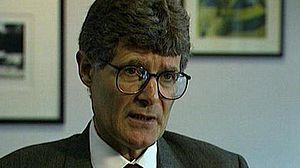Chris Woodhead facts for kids
Quick facts for kids
Christopher Woodhead
|
|
|---|---|

Woodhead in a BBC interview, May 1999
|
|
| Her Majesty’s Chief Inspector of Education, Children’s Services and Skills | |
| In office 1994–2000 |
|
| Prime Minister | John Major Tony Blair |
| Minister | John Patten Gillian Shephard David Blunkett |
| Preceded by | Stewart Sutherland |
| Succeeded by | Sir Mike Tomlinson |
| Personal details | |
| Born |
Christopher Anthony Woodhead
20 October 1946 Cockfosters, London, England |
| Died | 23 June 2015 (aged 68) |
| Known for | Chief Inspector of Schools Chairman of Cognita |
Sir Christopher Anthony Woodhead (born October 20, 1946 – died June 23, 2015) was an important person in British education. He was known for being Her Majesty's Chief Inspector of Schools in England from 1994 to 2000. During this time, he had many strong opinions about how schools should be run. Later, he became the Chairman of Cognita, a company that helps run private schools.
Contents
Sir Christopher Woodhead: A Look at His Life
Early Life and School Days
Christopher Woodhead grew up as an only child. His father was an accountant, and his mother worked as a school secretary. He went to Selsdon Primary School and then to Wallington County Grammar School in Surrey.
After finishing school, he studied English at the University of Bristol. He also earned a special certificate called a PGCE. This certificate is important for people who want to become teachers.
Starting His Career in Education
Christopher Woodhead started his career as an English teacher. He taught at Wallington County Grammar School for Boys and then at Priory School in Shrewsbury. Later, he became an assistant Head of English at Newent Community School.
In 1974, he earned a Master of Arts (MA) degree in English from Keele University. His last teaching job was as the Head of English at Gordano School. Early in his career, he supported "progressive" teaching ideas, but he later changed his mind.
In 1976, he stopped teaching in classrooms. He then started working to train other teachers. He helped with the PGCE course at the University of Oxford. He also held important jobs in education development in places like Devon, Shropshire, and Cornwall. From 1991 to 1994, he was a chief executive for important education councils.
Leading OFSTED
In 1994, Christopher Woodhead was chosen to lead the Office for Standards in Education (OFSTED). OFSTED is a service that checks how well schools are doing in England.
What is OFSTED?
OFSTED stands for the Office for Standards in Education, Children’s Services and Skills. Its main job is to inspect schools and other educational places. They check if schools are providing a good education. They also make sure schools are safe and well-managed.
His Strong Opinions
By the time he led OFSTED, Woodhead believed in "traditional teaching methods." He often disagreed with "progressive educational theories" that had become popular. Some people thought he was a brave reformer who wanted to fix problems in schools. They felt he was challenging the old ways of thinking in education.
However, others thought he made teachers feel bad. They said he rarely pointed out good things happening in schools. He often said that poor teaching was the main problem in schools. He famously claimed there were "15,000 incompetent teachers." He also said, "I am paid to challenge mediocrity, failure and complacency." His direct way of speaking made many people, especially teachers, upset.
When the Labour government came to power in 1997, many people wanted Woodhead to be replaced. But the Education Secretary, David Blunkett, decided to keep him in his role.
Why He Left OFSTED
On November 2, 2000, Christopher Woodhead announced that he was leaving his job at OFSTED.
Later, it was revealed that in 1997, he had gone against his own inspectors' decisions about a school called Islington Green School. He decided the school was failing, even though his inspectors had said otherwise. This decision caused difficulties for the school's staff and students.
After OFSTED
After leaving OFSTED, Christopher Woodhead became a writer for The Daily Telegraph and The Sunday Times newspapers. He said he felt the school inspection system was now strong. However, he also felt he could not support some parts of the government's education policy.
In 2002, he published a book called Class War: The State of British Education. This book was very critical of the British education system. Soon after, he became a Professor of Education at the University of Buckingham. He continued to speak publicly about education, often causing debate.
In 2004, Woodhead became the chairman of Cognita. This company owns and runs independent schools. His work with Cognita also drew attention.
In May 2009, he published his second book, A Desolation of Learning: Is this the education our children deserve?. This book looked closely at nearly two decades of education policies. He was also part of the Advisory Council for a group called Reform.
Images for kids
 | Precious Adams |
 | Lauren Anderson |
 | Janet Collins |


